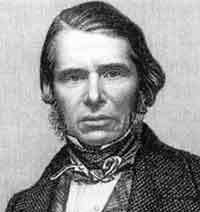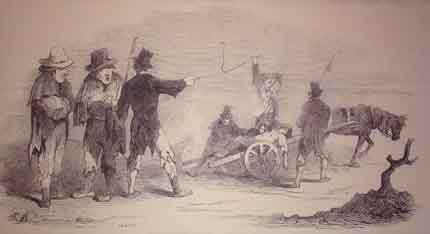The Fields of Athenry is a love song on one level but it is also a scathing commentary on the way the Irish Potato Famine was handled by the British Government.
Fields of Athenry
Fields of Athenry as a sports anthem
Fields of Athenry Videos
Lyrics and Chords
The failure of the potato crop would have caused hardship no matter how well the country was run.
However, it’s now widely accepted by historians that Government inaction and incompetence made the crisis far worse than it need have been.

They neither understood the scale of the famine, nor cared about its consequences. For example, Sir Charles Trevelyan was the Treasury official put in charge of famine relief in spite of the fact that he believed that the famine was a “mechanism for reducing surplus population”.
He became a hated figure in Ireland and is still remembered today.
He is the official named in The Fields of Athenry.
Most Irish land owned by British landlords
Most Irish land in the 19th century was owned by absentee British landlords living in England. Their main concern was to make as much money as possible. Most of them rarely even visited the land they owned and so had no affinity with the Irish people who worked the fields for them and paid high rents.
When the famine struck, the main concern of the landlords was to continue making money as usual. Consequently, starving tenants who could no longer eat or pay their rents because of successive crop failures were evicted from their homes. Most were left to die; some of the luckier ones managed to emigrate.
Meanwhile, shiploads of Irish wheat and other food produce were exported from Ireland while the starving masses looked on. If they tried to take any of the food they were put down by troops.
The Government did nothing to stop the export of food at this time. British officials believed in the economic philosophy of “laissez faire” which is a French term meaning, leave it alone or let it be. The idea was that there was no need for the Government to get involved because the ‘market’ would solve the problem.
The people were left to starve

This concept relied on the economic principle of supply and demand; if there was demand then the market would step in and provide the supply. This principle may have had some credence in a developed economy but it made no sense at all in famine torn Ireland. The Irish peasants not only relied on the potato for food, it was also their only source of income. If they couldn’t sell their excess potatoes, they couldn’t make money to buy whatever supply was provided by the ‘market’.
More than a million people died and as many more emigrated as a result of the Great Famine.
It is burned into the Irish consciousness; so much so that more than 150 years later, songs like The Fields of Athenry are still being written and still have relevance to millions of people all across the world.
Consequently, the market didn’t supply any food and so people were left to starve.
Hundreds of thousands of people died before the British Government accepted that the laissez faire principle wasn’t working. They were shamed into action but even then their response was half-hearted and incompetent. For example, Trevelyan arranged for Indian corn to be imported to feed the starving, not realising that it was too hard to grind and eat. It was useless and did nothing to alleviate the hunger.
To make matters worse, the law was merciless on anyone who stepped out of line to find food for their families. The theft of a loaf of bread could be enough to have a person sentenced to seven or 14 years hard labour in penal colonies such as Botany Bay, as happens to Michael in The Fields of Athenry.
Fields of Athenry
Fields of Athenry as a sports anthem
Famine background to the song
Fields of Athenry Videos
Lyrics and Chords
Other Famine songs
Fields of Athenry
The Praties They Grow Small
Skibbereen
Van Diemen’s Land

